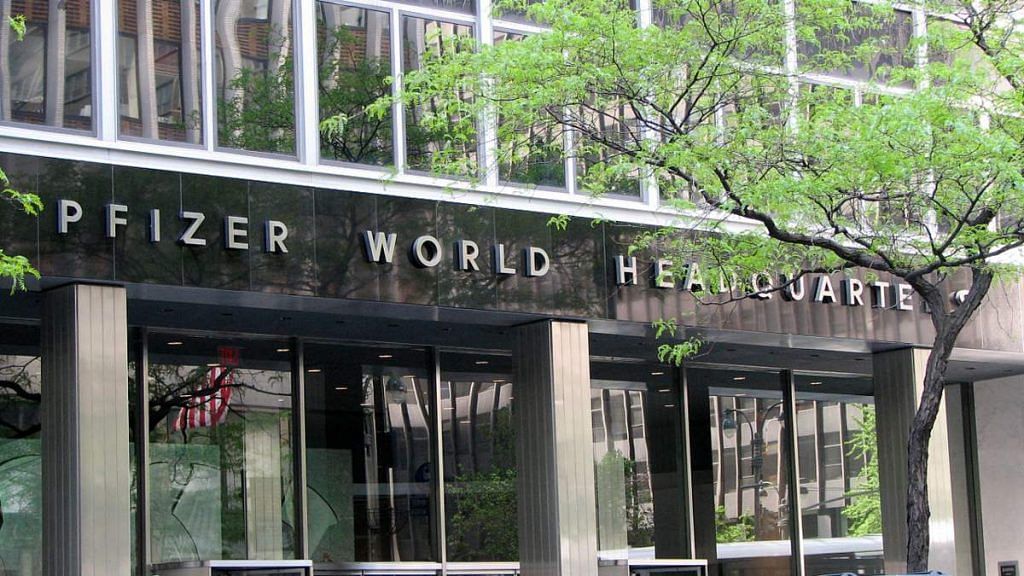New Delhi: Pricing of the Covid-19 vaccine developed by Pfizer-BioNTech will depend on the amount ordered and advance commitments with countries, the US drugmaker said Sunday.
In an email response to ThePrint, Pfizer’s official spokesperson said, “Our vaccine approach is based on the principles of ensuring broad access and supplies to governments. This is reflected in all aspects of our agreements with various governments, with the pricing strategy being an outcome of volume, advanced commitment, equity and affordability principles.”
The vaccine was recently approved by the UK and Bahrain governments. It will be made available in Britain from Monday, according to a statement from the UK government. The shots have shown 90 per cent efficacy in trials.
Pfizer has also become the first pharmaceutical firm to seek emergency use for its Covid-19 vaccine from the Drugs Controller General of India (DCGI). “Pfizer will supply this vaccine only through government contracts based on agreements with respective government authorities and following regulatory authorisation or approval,” the company said.
The company had earlier told ThePrint that its vaccine has the potential to be an important part of India’s early immunisation response against the pandemic.
“We remain committed to engaging with the Government of India and exploring opportunities to make this vaccine available for use in the country,” the official spokesperson Sunday added.
Addressing concerns about distribution, the company also said it will utilise GPS-enabled sensors in every thermal shipper that will allow Pfizer to track the location and temperature of doses across their pre-set routes.
Also read: Monitor efficacy of Itolizumab, not just safety, in Covid trials — expert panel tells Biocon
Pfizer addresses vaccine storage concerns
The main concern for developing countries like India has been the vaccine’s ultra cold storage requirements. Pfizer’s mRNA technology needs storage at -75 degrees Celsius (plus-minus 15 degrees) and this calls for storage and distribution infrastructure.
The company, however, said it has “experience working with customers in all markets to help ensure success”. It also highlighted that “detailed logistical plans and tools to support effective vaccine transport, storage and temperature monitoring” has been developed.
The company spokesperson said Pfizer will utilise road and air modes of transportation via main carrier partners. “We have also developed packaging and storage innovations to be fit for purpose for the range of locations around the globe where we believe vaccinations will take place.”
How India can store Pfizer’s vaccine
According to Pfizer, it can offer three type of solutions to cater to the storage and distribution requirements in India. The firm said that its vaccine can be stored in “ultra-low-temperature freezers, which are commercially available and can extend shelf life for up to six months”.
The firm also has specially-designed, temperature-controlled thermal shippers, in which doses will arrive, that can be used as temporary storage units.
“The shipper can maintain the recommended storage condition -70°C±10°C for 10 days unopened which allows for transportation globally to ensure all patients have access,” it said, while adding that once opened, and if being used as temporary storage by a vaccination centre, then the vaccine can be used for a total of 30 days with re-icing every five days.
The company further added that refrigeration units that are commonly available in hospitals can also be used. “The vaccine can be stored for five days at refrigerated 2-8°C conditions.”
Pfizer said that it has been having discussions with Gavi, a public-private global health partnership, on behalf of the COVAX Facility to support the needs of beneficiary countries. In India, the company said, COVAX would provide vaccines for at least 20 per cent of the total population.
“It is our intention to achieve equitable global distribution of vaccine supply in alignment with identified priority populations,” company said.
Also read: How to prevent future pandemics? 22 leading scientists tell us
